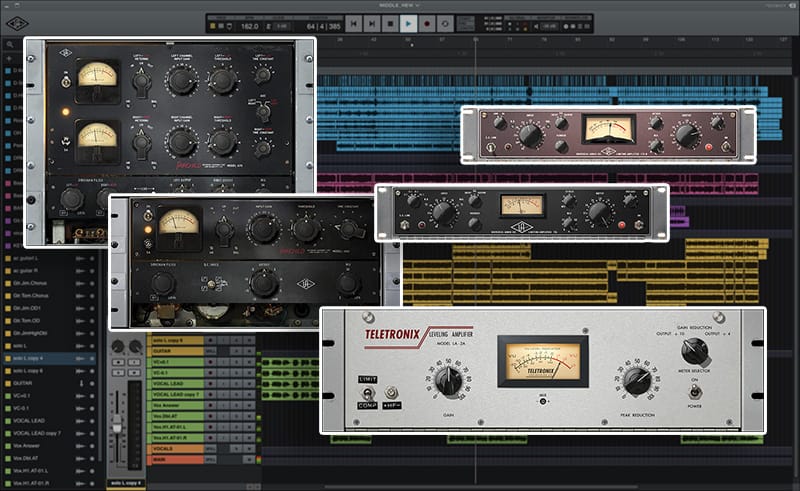
Why is the Teletronix LA-2A the world's most famous audio compressor?
- Why Audio Compression is Important
- What are the Different Types of Compressors?
- The History of the Teletronix LA-2A Compressor
- Explore Reissue LA-2A Hardware
- Emulating the LA-2A: Capturing the World's Most Famous Compressor
- The LA-2A: Used on Everything, in Every Genre
- Discover the Iconic Tone of the LA-2A on your Productions
Learn how this tube limiter became the go-to for warm vocals, bass, and more.
When it comes to adding timeless, warm compression to vocal, bass, guitar, and piano, the Teletronix LA-2A enjoys legendary status among old-school engineers and modern producers alike.
Released in 1962, the LA-2A would go on to become one of the greatest audio processors of all time, and used on countless hit recordings to this day.
But first we need to understand why audio compression is so vital to professional recordings.
Why Audio Compression is Important
At its most basic, compressors and limiters reduce the span between the softest and loudest parts of an audio signal. When used properly, compression will give your tracks a punchy, balanced, and loud sound, while also injecting coloration and tone for album-ready results.
But over-compressing can squeeze the life out of your recordings. So having a good grasp of the basics will ensure that you are getting the most out of this essential tool.
Read: Learn the Basics of Audio Compression
What are the Different Types of Compressors?
The Teletronix LA-2A is the gold-standard for optical limiting, while famous tube limiters include the Farichild 660 and 670, and the Universal Audio 175B and 176.
Iconic solid-state limiters — which includes FET and VCA designs — with hit-record pedigree include the Empirical Labs EL8 DIstressor, API 2500 Bus Compressor, dbx 160, and of course the UA 1176, all shown here.
So why would you use one over the other?
Why, the sound of course. Tube limiters compress your source material with different color, tone, and texture, whereas solid-state imparts an equally appealing, faster compression character.
For example, use a tube compressor like the LA-2A to give vocals warmth and texture or tame a bass line while making it more prominent in the mix.
Conversely, use a solid-state compressor like the 1176 to deliver punchy, aggressive drums or to bring out the attack of a strummed acoustic guitar.
Read: Tube vs. Solid-State Compression Basics
“The Teletronix LA-2A compressor treats your signal so lovingly and responds especially well to the human voice in a way that inspires great performances.”
— UA CEO Bill Putnam Jr.
The History of the Teletronix LA-2A Compressor
During a stint at Los Angeles radio station KMGM, Jim Lawrence — the founder of Teletronix Engineering — became frustrated with having to ride the gain to maintain a constant signal level on the air.
From that frustration the idea of a “leveling amplifier,” was born. Lawrence drew from his background with military optical sensors to design a circuit which would “level” the incoming audio signal.
This optical attenuator used inside of every LA-2A — known as the T4 — is what gives the LA-2A its gentle, program dependent optical compression, revered to this day by audio professionals worldwide and a technological breakthrough, far surpassing the stability and transparency of earlier circuits.
The rest, as they say, is history.
Over the years, the LA-2A underwent various revisions, with subtle cosmetic and component modifications, but still remained one of the most sought-after pieces of vintage studio gear ever made.
Watch: What is an LA-2A, and what makes it special?
Read: Learn the History of the Teletronix LA-2A
Explore Reissue LA-2A Hardware
When Bill Putnam Jr. refounded Universal Audio in 1999, reissuing the classic LA-2A compressor hardware was at the top of his list. But he knew it would not be easy.
Replicating the crucial T4 optical attenuator for a faithful LA-2A reproduction involved a lengthy study of the original photocell formula — including working with both modern device physicists and the developers of the original 60s-era photocells.
“The LA-2A's photocell is really hard to get right,” recalls Bill Putnam, Jr. “For our reissue, we had a challenging time developing that part. It required working with the original manufacturer to perfect it, to dial it into the specifications of the original photocells from the 1960s. The optical sensor T4 variant we worked to develop is customized for us. No one else has it.”
Like the original vintage hardware, the reissue LA-2A unit is point-to-point handwired at UA's Custom Shop in Santa Cruz, California, with every component carefully evaluated for authenticity. As a result, today’s LA-2A gives your recordings the same legendary compression characteristics of the rare hardware.
Emulating the LA-2A: Capturing the World's Most Famous Compressor
In 2001, Universal Audio set the standard in analog emulation with the original UAD LA‑2A plug‑in. It quickly became a go-to for engineers and producers who were starting to work exclusively "in the box."
Fast-forward to 2013, UA’s engineers redesigned the Teletronix LA-2A plug-in, adding the vintage hardware's tube amplifier and transformer characteristics, improvements in T4 gain reduction nonlinearities, and superior time constant behaviors.
Not only did these tweaks make the LA-2A plug-in versions nearly indistinguishable from the vintage hardware, the collection gives users three versions of the LA-2A — the LA-2A Silver, LA-2A Gray, and original LA-2 — each with their own distinctive sonic attributes, right in your DAW.
Read: The Teletronix LA-2A Classic Leveler Collection
The LA-2A: Used on Everything, in Every Genre
Showing up on "Best Compressor" lists consistently, the Teletronix LA-2A compressor is used by producers in every genre, from hip-hop to rock, R&B to dance and country music.
Hit-makers like Just Blaze have relied on the hardware and plug-in versions of the LA-2A on hip-hop vocals for decades, while Grammy-winner Jacquire King uses the LA-2A to smooth out live vocal performances.
And the list goes on! From the modern rock of Cold War Kids to legendary records by Rush and Dream Theatre to dance floor bangers from Daft Punk and Armin Van Buuren, the Teletronix LA-2A remains a key ingredient for music makers everywhere.
In fact, even mastering engineers will sometimes use the LA-2A limiter to add the final "cherry on top" with its gentle warmth, tone, and character.
Discover the Iconic Tone of the LA-2A on your Productions
The first thing every engineer says about the LA-2A is that it's easy to get a great sound quickly. No matter if it's drums, bass, vocals, guitars, the LA-2A's simple controls and "gentle" touch make a bad sound virtually impossible.
Watch these videos and learn how to easily record an album-ready hip-hop vocal, or add punch to a rock track using the Teletronix LA-2A compressor, and experience the rich tube sound of the most famous compressor ever made.
En lire plus
How to Recreate Iconic Vocal Chains
Learn how to capture album ready vocals in any genre, all with a single Sphere DLX modeling microphone and selection of UAD plug-ins right in your DAW.
Secret Compression Tricks: How to Use the 1176 Limiter
Learn how to easily add punch and analog character to your drums and vocals using the iconic 1176 compressor plug-in.
Pro Tips Revealed: How to Use the Teletronix LA-2A Compressor
Learn how to add warm optical tube compression to your drums, vocals, and piano with the Teletronix LA-2A Classic Leveler Collection's three distinct limiters.






